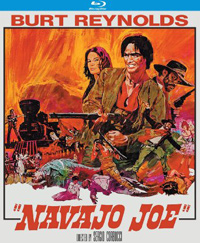 Kino Lorber brings the infamous 1967 Spaghetti western Navajo Joe to Blu-ray, an overlooked gem of the genre that’s long been shadowed by its troubled reputation and the continual disparagement of its lead star, Burt Reynolds. In retrospect, this Italian/Spanish co-production promises to be a bit too politically incorrect to be taken seriously considering the casting of American star Reynolds as a Navajo Indian (he is, in fact, partly of Cherokee descent, though not enough to avoid the necessity of bronzer and a black wig).
Kino Lorber brings the infamous 1967 Spaghetti western Navajo Joe to Blu-ray, an overlooked gem of the genre that’s long been shadowed by its troubled reputation and the continual disparagement of its lead star, Burt Reynolds. In retrospect, this Italian/Spanish co-production promises to be a bit too politically incorrect to be taken seriously considering the casting of American star Reynolds as a Navajo Indian (he is, in fact, partly of Cherokee descent, though not enough to avoid the necessity of bronzer and a black wig).
It’s hardly the first or last time we’ve seen whitewashed casting of Native Americans (Audrey Hepburn in John Huston’s 1960 western The Unforgiven comes to mind), and to many the casting seems to compromise the integrity of the title. Instantly reviled and dismissed by Reynolds in his second starring role during his transition from television to film, it is, nevertheless, a very memorable and enjoyable artifact of the then popular film movement.
The heartless bandit Duncan (Aldo Sambrell) leads his band of merciless men across the country, murdering hordes of Native Americans, including women and children, selling their scalps for cheap money. Times are beginning to change, and white buyers don’t seem keen to buy the scalps of innocent people, leading Duncan to attempt more daring crimes. Arriving in the town of Esperanza, Duncan teams up with a crooked doctor to rob the town’s bank. However, a survivor of Duncan’s rampages, the highly skilled Native American known as Navajo Joe (Reynolds), is keen on revenging the death of his wife, brutally killed by Duncan. Joe manages to come to the rescue of a trio of prostitutes terrorized by Duncan, asserting himself as the Sheriff of Esperanza, a move assisting him in the downfall of the dangerous clan of lawless men. A pretty mixed woman, Estella (Nicole Machiavelli) provides extra motivation for Joe to succeed.
Famously, Reynolds revealed he signed on for the vehicle thinking Sergio Leone would direct, the progenitor of the Spaghetti Western thanks to his Man with No Name trilogy starring Clint Eastwood. Crafted to emulate the success of those films, with producer Dino de Laurentis looking to breed another matinee star from the vehicle, Reynolds was unable to back out of the project, referring to its director Sergio Corbucci as ‘the wrong Sergio,’ an attitude which caused unpleasantness on set and resulted in Reynolds stating it was the worst experience he ever had making a film.
The film was scripted by Piero Regnoli (under the pseudonym Dean Craig, known for several giallo titles, including Bava’s I Vampiri) and Fernando Di Leo, the famed/writer director who started out in spaghetti westerns but became one of the most prominent figures in the eventual poliziottechi genre of films. Here, the writers seem to be following a straightforward trajectory supposedly lifted from historical instances.
Reynolds’ disparagement of Corbucci as a talented director, however, is unfounded. An underrated auteur, Navajo Joe came, along with several other titles, between his now celebrated benchmarks like 1966’s Django starring Franco Nero, and the excellent 1968 film The Great Silence starring Jean-Louis Trintignant and Klaus Kinski.
It’s no surprise to find Quentin Tarantino considers the film one of the greatest examples of the genre, and reconfigured Ennio Morricone’s magnificent score for the Kill Bill films. The enigmatic score, credited to Morricone’s pseudonym Leo Nichols at the time, adds quite a bit of ambience to the rather routine narrative.
Corbucci’s film features considerable brutality, at least in comparison to other examples from the period, and was quite adept at featuring incredibly cruel villains (though the finale is hardly as dark and dire as The Great Silence). Here, it is Aldo Sambrell, who also starred in Leone’s trilogy. Italian actress Nicoletta Machiavelli, a bit too beautiful for the period, plays a mixed race love interest for Reynolds (she would later appear in Zulawski’s 1975 film The Most Important Thing is to Love), while Spanish actor Fernando Rey appears as a priest.
Disc Review:
Kino presents the transfer in 2.35:1. Some close-ups of Reynolds tend to be a bit distracting thanks to the make-up, and considerable grain is evident in a couple sequences, which includes some significant blur. Optional audio commentary from film historian Gary Palmucci is also available.
Final Thoughts:
Despite Reynolds’ historical dislike for the title, Navajo Joe remains one of the more notorious of the peripheral spaghetti westerns, and an impressive array of talented cinematic names confirms it as a must see. Throughout Morricone’s illustrious and notable filmography, the score alone stands out as one of the famed composer’s top ten best.
Film Review: ★★★/☆☆☆☆☆
Disc Review: ★★★/☆☆☆☆☆


